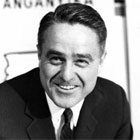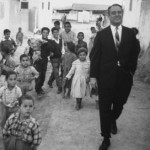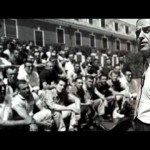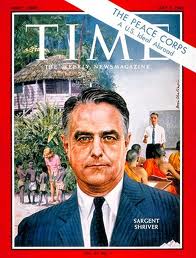The Peace Corps Speaks For Itself
[This is, as you see, a very early talk by Shriver about the Peace Corps. It was given in the first month of the agency. Indeed it was given in the first days, 23 days after the signing of the Executive Order creating the agency. I want to thank Bob Arias (Colombia 1964-66) for bringing it to my attention and sending me a copy. It is interesting to read the early expectations Sarge had about the Peace Corps, and what he hoped all of us would achieve overseas. Did we fulfill his dreams? Has the Peace Corps lived up to his lofty goals all these 50+ years later.]
THE PEACE CORPS SPEAKS FOR ITSELF
Speech by Robert Sargent Shriver, Jr.
Director, The Peace Corps
New York Herald Tribune Youth Forum
March 24, 1961
I was invited here to speak for the Peace Corps, but in a sense, no one can do that.
The Peace Corps Speaks for Itself
It has spoken already to the heart of a young nation-a nation which 45 percent of the people are under 25 years of age.

Photo by Rowland Scherman
It has spoken to thousands of Americans who have written to say: “I want to serve my country. Tell me what to do?”
A college student wrote from California: “I will go wherever I can help. I’ll do whatever I can.”
A high school student in Philadelphia sent this message: “I don’t care about a salary. This is something I want to do for my country.”
And from the Southwest-from a young farmer there-the Peace Corps got this letter: “If you can use my plow, it is ready. If you can use me, I am ready, too.”
It is impossible to answer your question: “What is the Peace Corps?”
The Peace Corps is 17 thousand people and more, most of them young, many of them older, who have already volunteered in letters sent to Peace Corps headquarters in Washington.
It is a Wisconsin reporter, who got a telegram from me during the middle of the night, asking him to come to Washington to handle our public information. He arrived that same day at 4 o’clock-went to work at 5-and has been back in Wisconsin only once since.
It is a New York educator who responded to an urgent SOS. “come quickly,” I called. “We need you in a hurry.” He got on the next plane.
The Peace Corps is a Georgia lawyer, who left his practice to come to Washington-at his own expense-to serve as our counsel-to work on a case that will be heard before the bar of the world.
But the Peace Corps is more.
It is a lonely native in Africa, squinting in the sun at the pages of a book he cannot read.
It is a farmer in Asia, tilling an acre of ground to feed a family of ten-and feeling that the centuries have passed him by.
It is a bright face of a young boy in Latin America, who senses intuitively that life can contain more than a hut with beans and bread.
The world is coming alive. New countries are bursting with activity. In Latin America and the Middle East, in Africa and Asia, there is an urgent desire to leap into the twentieth century.
The Peace Corps is part of our effort to help make that leap forward a success. It is part of our effort to help in the world-wide assault against poverty, hunger, ignorance and disease-a grass roots, rice roots volunteer effort of free men.

Photo by Paul Conklin
As we see it, the Peace Corps is a trained group of skilled workers-and I emphasize trained and skilled-a trained group of skilled workers, young in years, mature in judgment, dedicated in purpose, voluntary in character, ready to go and work anywhere in the world at the discretion of the President of the President of the United States.
They will go, however, only where they are asked. We shall not impose the Peace Corps on anyone or any country.
Our Peace Corps Volunteers will teach LANGUAGES-English where it is wanted and needed-other subjects where they are requested.
They will FIGHT DISEASE-by bringing the scientific information about health, sanitation, and medicine where it is needed.
They will work to IMPROVE FARM METHODS, animal care, irrigation, land use, fertilizer, and marketing methods.
If asked, they will serve in LOCAL GOVERNMENT-as clerks, administrators, and helpers.
All of this will be an effort on our part to encourage the development of newly emerging nations-and to develop with them. Every Peace Corps volunteer who goes abroad will have something to offer to the people with whom he lives and works-and to learn from them.
There has been an important missing link in our existing programs of foreign assistance-and that link was well described at this Forum by a student from Pakistan, who said:
“We are not ungrateful for the ad we have received.
But it would be infinitely better if it could be done
In a more direct and personal way.”
A more direct and personal way-that is the way of the Peace Corps and that is an important difference between the Peace Corps and other programs of mutual assistance.
The leader of an Asian country was touring his nation recently when he came upon a village that looked cleaner, bright, wider-awake than those he had already visited. Working on the outskirts of the village was a group of men, including some young Americans.
The leader, speaking in French, said to his interpreter: “Ask that young man what he is doing her. How has he been able to help my people improve their villages?”
The translator conveyed the message to the young Americans, who replied: “Please explain that my French is not good enough to converse with him, but if he will permit me to use his own language, I will try to tell him what we are doing here.” And, fluently in the native language the young American told how he had been working —and living-and learning with-the people who were now his friends.
“That,” the leader said later, “was the most impressive thing I have seen in a long time.”
Who was this young man? He was just an ordinary citizen who had committed himself to responsible role in the world crisis and who, by accepting the discipline inherent with that responsibility, was able to make an investment in peace.
I have been talking about what American can give working as members of the Peace Corps. It is important to emphasize that they will receive as much as they give, and perhaps more. I want to make it clear that when our Peace Corps volunteers go to other countries they will go to learn, not just to teach.
In our shrinking world all peoples of the world are neighbors. It is the responsibility of all of us to understand our neighbors and to learn from one another. Because the members of the Peace Corps are eager to have a better understanding of their neighbors in other countries, they are asking for the opportunity to live abroad and to work with people of different cultures so that they may understand and learn their way of life.
I hope that the day will come when our Peace Corps volunteers work side by side with Peace Corps volunteers from other nations, and when contingents of Peace Corps volunteers actually include your man and women from other lands.

Photo by Rowland Scherman
I want to say to the large number of students here from other countries that your own efforts can be extremely valuable to the Peace Corps. You can inform your friend in your own countries about our program—and you can help Peace Corps volunteers personally and directly if they do come to y our country. You can work for the establishment of ‘peace corps’ programs in your countries.
We intend to consult with students and teachers from other nations about our training programs-we hope to bring those students and teachers into those programs to help our people to prepare for their assignments abroad. It is essential for our own volunteers to know a great deal about the history and customs of forging countries before they come to live and work.
For after all, this is a mutual enterprise-a project capable of enlisting support all around the world.
American has always expected much from its youth. Alexander Hamilton was 31 when he wrote the Federalist papers, and Thomas Jefferson was 33 when he wrote the Declaration of Independence. John Kennedy at 43 was elected President of the United States-and at 45 I am the oldest member of the Peace Corps staff.
More importantly, the young men and women of the world are on the move. The President of the Central African Republic is 31. The chief of state of Guinea is 39. Mauritania’s Prime Minister is 37. The Prime Minister of Morocco is 32. In this world it is an asset to be young-and to be committed to responsibility.
So, if we can work together-if our Peace Corps volunteers can impart some of the technical knowledge we have learned in the last few generations-and if they in turn can learn something of the cultures that have developed in other nations over many generations-the Peace Corps will work as it should.
We hope the activities of our volunteers will help the people of other nations to understand the true nature of America-and that our volunteers will gain a greater knowledge and a deeper understanding of the people of other nations. It is a two-way street.
It is this mutual understanding-this deeper appreciation-that leads to mutual respect and to world peace.

So proud to be a part of this! The middle photograph, I believe, is by the late Paul Conklin. The other two are by me. How I miss Sarge Shriver! How glad am I that there’s a John Coyne to be our Boswell.
“A more direct and personal way” — that sums it up nicely. Great speech!